Results
-
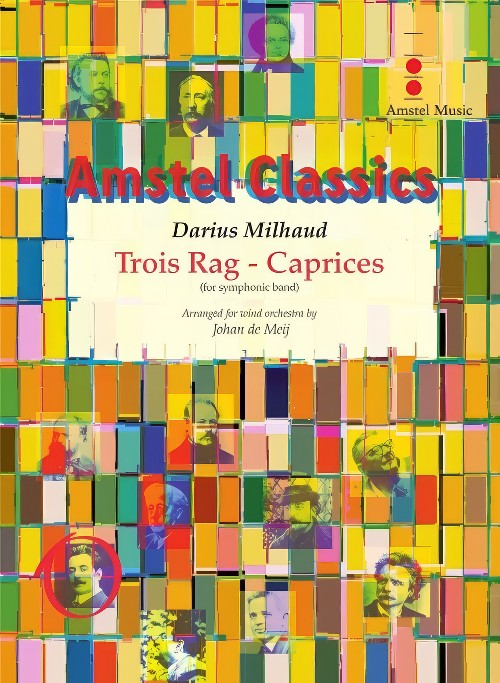 £148.00
£148.00Trois Rag - Caprices (Concert Band - Score and Parts) - Milhaud, Darius - De Meij, Johan
The French composer Darius Milhaud (1892-1974) was a member of the Groupe des Six. This group of six composers gathering Honegger, Poulence, Auric, Durey, Tailleferre and Milhaud, imitated Erik Satie by revolting against the deeply rooted traditional conventions of that time. They reacted against impressionism (Debussy) and romanticism (Wagner, Mahler) and felt very strongly about the music of Satie and Stravinsky. Milhaud's most popular work is undoubtedly the ballet La Creation du Monde, one of the most striking examples of jazz influences in classical music. The premiere at the Theatre des Champs Elysees in October 1923 caused a real scandal with the Paris public. The Trois Rag-Caprices for piano were composed one year earlier, in the summer of 1922, and could be considered as a kind of preliminary sketch for La Creation du Monde. There are indeed clear similarities between both compositions as to the rhythmical and harmonic aspects. The Trois Rag-Caprices were orchestrated for symphony orchestra by Milhaud himself some time later. The same happened to Saudades do Brasil (1920), a piano composition punctuated with Latin-American influences, which was written after his stay in Rio de Janeiro (1917-18) exactly as his ballet Le Boeuf sur le Toit. Johan de Meij's orchestration of Trois Rag-Caprices for symphonic band is a most welcome addition next to the original band works of Milhaud, such as Suite Francaise (1945) and West Point Suite (1951).Duration: 8.00
Estimated dispatch 7-14 working days
-
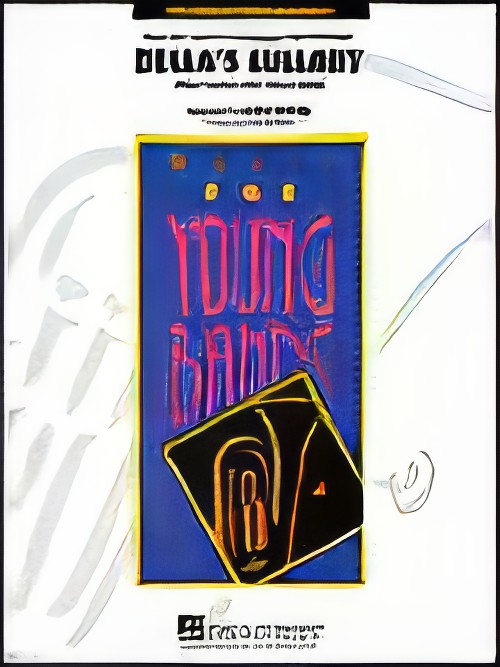 £47.50
£47.50BELLA'S LULLABY (from Twilight) (Young Band) - Burwell, Carter - Murtha, Paul
From the blockbuster movie Twilight, here is the hauntingly beautiful main theme. This marvellous setting features a piano solo as well as nicely scored woodwind passages. An optional solo flute part is also included as a substitute for the piano. This memorable melody is sure to stick with you. Duration 2:45
Estimated dispatch 7-14 working days
-
 £67.32
£67.32Moonlight Sonata
The lush and haunting sounds of Beethoven's universally loved "Moonlight Sonata" are faithfully brought to life in Andrew F. Poor's colorful setting for band. Listeners and performers alike will be able to imagine Beethoven sitting at a piano as the sounds of the band dramatically emerge from the musical score. As an added feature, this beautiful setting includes an optional piano part that, along with the band, are sure to make this work a favorite with both your students and audiences alike. Perfect for any concert or contest program.
Estimated dispatch 7-14 working days
-
 £49.50
£49.50Spinning Song
A delightful arrangement of one of the most popular piano teaching pieces of all time. It makes a unique band piece and your audience members will remember it from their days of piano lessons. Delicate syncopation and distinctive harmonic content make this a wonderful teaching tool and an outstanding choice for any concert or contest performance. Very highly recommended!
Estimated dispatch 7-14 working days
-
£104.99
The Great Gate of Kiev Wind Band Set (Score & Parts)
The Russian composer Modest Mussorgsky (1839-1881) was self-educated to a large extent but went on to become one of the ?Mighty Five? which also included Balakirev, Cui, Borodin and Rimsky-Korsakov. Today he is considered the innovator of Russian music par excellence. He composed Pictures at an Exhibition in 1874, inspired by ten pictures produced by his then recently deceased friend, the Russian architect and artist Victor Hartmann. The French composer Maurice Ravel made an orchestration of Mussorgsky?s composition in 1922 which is now more well-known and more performed than the original piano suite. For his transcription of Pictures at an Exhibition, Tohru Takahashi made use of the original piano composition by Mussorgsky. The Great Gate of Kiev, issued here separately, is probably the best known melody from this classical masterpiece. 0:05:45
Estimated dispatch 7-14 working days
-
 £7.00
£7.00TUNES FROM THE TRENCHES (SSA vocal score) - Lawson, Peter
For SSA choir and orchestra or concert band, or choir and piano.A non-stop medley of tunes from World War One from recruiting through to the Last Post. This arrangement can be performed by a choir with either an orchestra, band or piano accompaniment. There are different choral versions available for Mixed Voice Choir - both SATB (GM131) and, for those with a shortage of male voices, SA+Men (GM134) - for Upper Voice Choir (SSA - GM132) and for Male Voice Choir (TTBB - GM133). The orchestra score and parts (GMCP020) can be used either on its own or to accompany a choir.The recruiting song "Your King and Country Want You" starts us off followed by "Goodbye, Dolly Gray" as the soldiers leave for war. "Belgium put the Kibosh on the Kaiser" is followed by some proper trench songs - various lyrics were improvised by the soldiers!! - "Three German Officers crossed the Rhine" and "They were only playing Leap-Frog". "The Bells of Hell go Ting-a-ling-a-ling" leads to strains of "Stille Nacht" recalling the Christmas truce. "When this Lousy War is Over" and "There's no place like Home" are balanced by "Land of Hope and Glory" before the Americans arrive with "The Caissons go Rolling Along" and "Over There". "It's a Long Way to Tipperary" brings us towards a rousing finish save for an optional "Last Post-lude" to end reflectively.
Estimated dispatch 7-14 working days
-
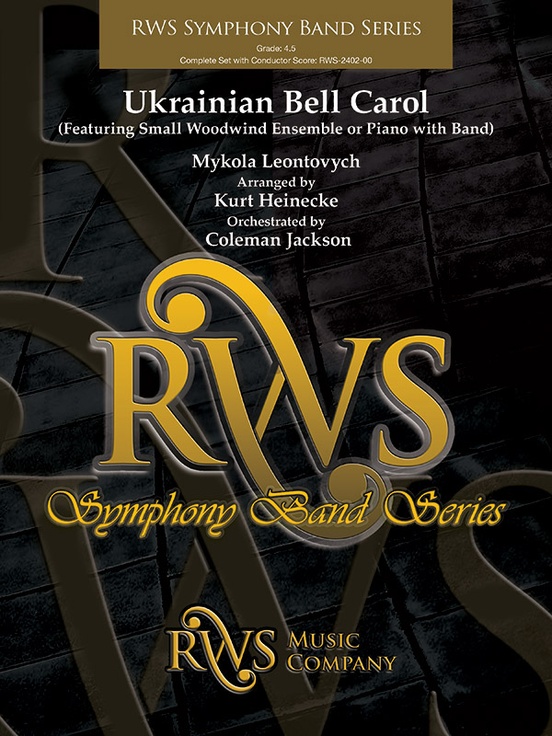 £119.00
£119.00Ukrainian Bell Carol - Mykola Leontovich / arr. Kurt Heinecke / orch. Coleman Jackson
Kurt Heinecke's new setting of is the perfect arrangement to inspire hope this holiday season and to acknowledge the spirit of the Ukrainian people. The piece opens with a small woodwind ensemble or solo piano stating a haunting four-note motif derived from a Ukrainian folk song. This ever-popular carol arrangement, featuring the small ensemble or piano throughout, develops and grows to a powerful climax. Appropriate for high school, university, and professional bands, it is the perfect show stopper for your holiday concert. (3:44)
Estimated dispatch 3-5 working days
-
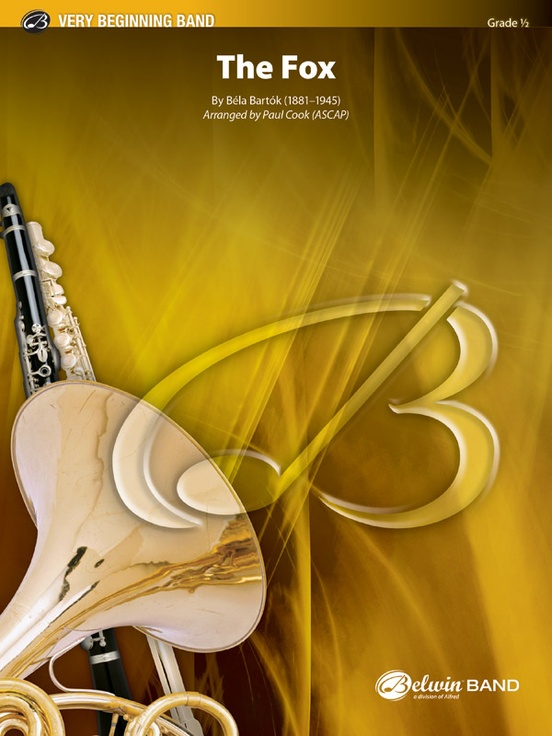 £47.50
£47.50The Fox - Béla Bartók / arr. Paul Cook
One of the numerous short piano pieces for children that Bla Bartk completed in a four-volume piano collection in 1909. This arrangement for early band students remains faithful to Bartk's intent while comfortably accommodating the skills for first year players. Light and whimsical, you can hear the playful nature of "The Fox" in this solid scoring for your beginners. (1:45)
Estimated dispatch 3-5 working days
-
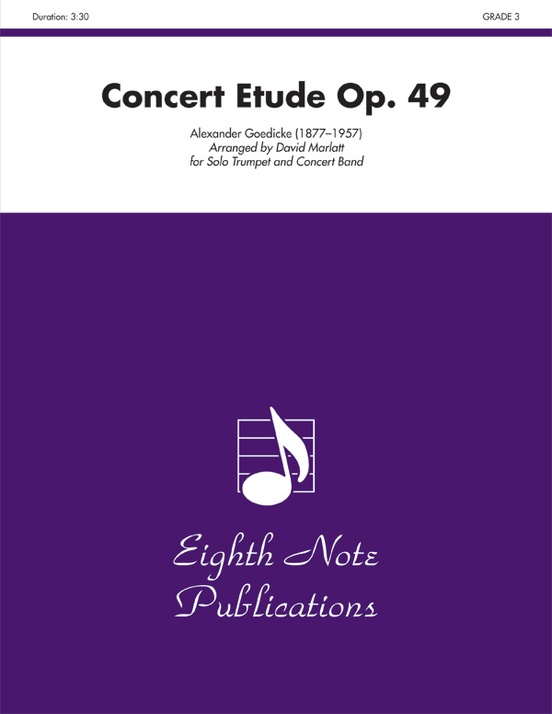 £62.95
£62.95Concert Etude, Opus 49 - Alexander Goedicke / arr. David Marlatt
This is a flashy trumpet solo that is often heard in concert, recital and competition situations. The brisk tempo combined with bursts of double tonguing have made this a popular technical showpiece with trumpet players all over the world. This work is on many contest and festival lists and many high school players choose to perform this as an audition piece for college / university. Originally scored for trumpet and piano, the use of a full concert band rather than piano adds a whole new depth, timbre and color to the sound.
Estimated dispatch 3-5 working days
-
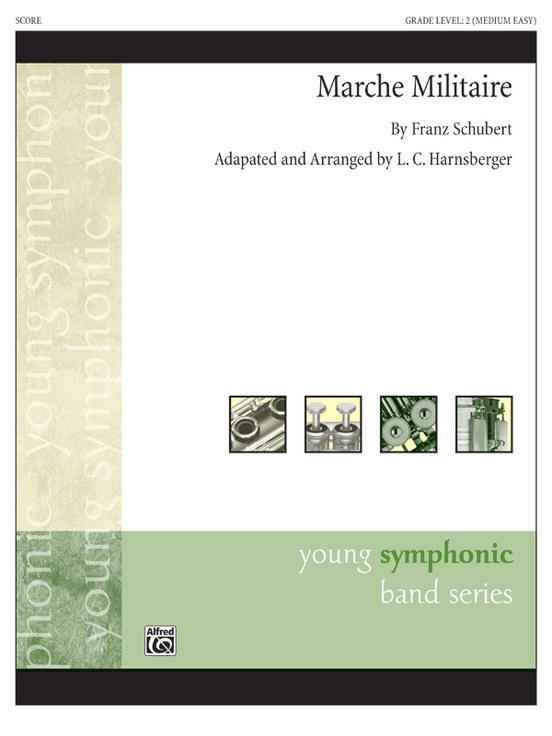 £52.95
£52.95Marche Militaire - Franz Schubert / adapted and arr. L. C. Harnsberger
One of the most familiar and popular marches ever written is Franz Schubert's . Schubert (1797--1828) was one of the most prolific composers of all time, having written symphonies, chamber music, piano works, and over 600 songs, yet he only lived to the age of 32. The march was originally written for piano four-hands, however, this arrangement for young band sounds as if it was first written for military band. Woodwinds, brass, and percussion all shine with fun and interesting parts that work well together. This arrangement is perfect for an opener or closer to any concert.
Estimated dispatch 3-5 working days
